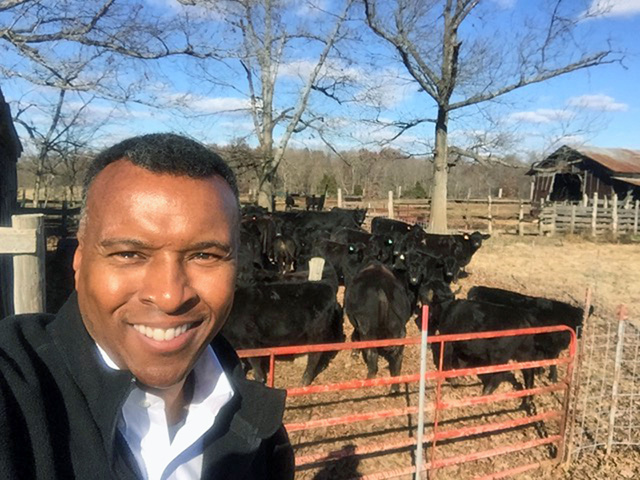Meat Shortages Build Markets
Cattlelink - Meat Shortages Build Markets
A lot of beef producers have worked hard the last few years to reach consumers hoping for income streams tied to direct sales. Today, all of that has flipped. In many areas, consumers are now reaching out to their local farmers looking to buy product directly from the source.
Third-generation Virginia beef producer Basil Gooden says one result of current meat shortages may well be a long-term change in how people buy and consume food.
Gooden is a visiting scholar at Virginia Commonwealth University in the Sustainable Food Access Core of the Institute for Inclusion, Inquiry and Innovation (iCubed). He has served as Virginia secretary of agriculture and forestry, as well as the Virginia State director for rural development at the USDA. He believes the Covid-19 pandemic has the potential to impact future connections between beef producers and their local communities.
The Goodens' family farm is an Angus-based commercial cow/calf operation with about 80 head in Buckingham County, Virginia. Gooden says they were in the process of transitioning the operation to more direct sales before the pandemic.
"We believe there is a lot of long-term opportunity in that approach, and we're encouraging others to look at direct-sales platforms, especially in this time of panic buying," he explains. Gooden notes that in his area, not only are buyers looking for direct sources for meat, but he's seeing more interest in gardening.
"Simply put, people are more interested now than ever in knowing where their food comes from," he says. "I also find it interesting in reading reports that we're not seeing those plant-based food products flying off the shelves. I think in times of stress and uncertainty, people go back to what they know."
P[L1] D[0x0] M[300x250] OOP[F] ADUNIT[] T[]
PRICING QUESTIONS
As someone who loves agriculture, Gooden says he's worked throughout his career to find ways small farmers can benefit by meeting local food needs. Currently, many of his conversations are around the price of commodities, specifically beef. Many producers feel they have not been treated fairly by traditional consumer markets.
"As someone who takes beef to market, I can speak firsthand about not getting paid close to what we should based on work and effort. But, looking at the bigger picture, it's important to understand there is a lot that goes into the process that takes beef from the farm to wherever it is sold. All along the way, whether it's distribution costs or marketing, there are costs the average farmer never sees. In traditional markets, we don't assume that responsibility, but someone in that supply chain does. There are a lot of layers, a lot of costs, we never see."
Current conditions may make building that direct-sales platform more attractive for many producers. Gooden explains it has become clear to many in our communities that farmers are not paid their true worth.
"It's the underpaid who are the ones we are really depending on right now. When people are concerned they may not have enough food to eat, maybe they wake up and say, 'Let me value a farmer more, let me pay a little more, let me create these relationships and support my local farmers.'
"If you can sell directly to the people who will cook and consume your product, that is ideal. You develop a relationship with that end consumer. They know you, and they know your operation. You can share with them your views on sustainability, how you are an environmentally friendly producer who uses humane practices. When they know you, they are interested in your future. It's a win-win-win."
A NEW GENERATION
Gooden admits it takes time to build direct markets. But, he says a successful approach he's seen is to bring in the next generation, allowing them to work on this part of the business.
"Every farmer or livestock producer doesn't want to do direct marketing. There can be a huge learning curve. We may be the best at production but not good in marketing or salesmanship, or promoting ourselves. Many farmers are humble, they'd rather be out working in the field or tending their livestock. By bringing in the next generation, we cannot only build new markets but create opportunities for the farm to support more family members. This is a time we can lean on the younger generation to bring in new ideas that could make a huge difference moving forward."
An ongoing challenge for direct sales, Gooden adds, is availability of USDA slaughterhouses. He says in his experience, this can be very frustrating, and it can seem like a limitation.
"I used to be state director for rural development in Virginia, and we put a lot of money into rural slaughterhouses. One we had high hopes for recently closed. That's hard to see. It's challenging to make them go, but we have to keep at it."
OUTSIDE RESOURCES HELP
Lastly, Gooden says farmers need to remember they have resources, whatever their concerns right now. He encourages producers to reach out to their local Extension specialist or county agent, whatever the issue, from financial to a need for help with anxiety or depression.
"Today, the average American is more aware they are relying on a farmer than they have ever been before. I'm encouraging everyone in agriculture to hang on and see this as a chance to grow and be better, and make connections locally. This could really change the future of our industry in a lot of meaningful ways."
[PF_0720]
(c) Copyright 2020 DTN, LLC. All rights reserved.




